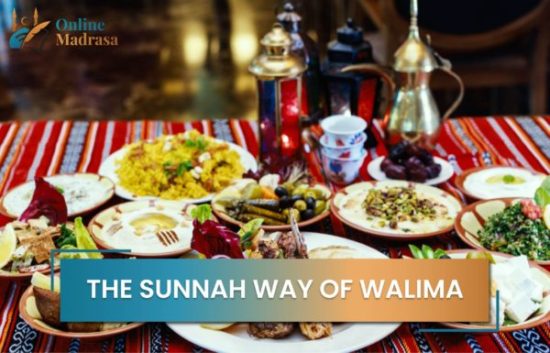The Sunnah Way of Walima

Marriage is a sacred knot, which binds a man and a woman in a formal and legal relationship. Nikah is the first while, Walima, or the marriage feast, is the second of the two conventional parts of an Islamic wedding. The Walima is performed after the Nikah or wedding service.
Meaning of Walima: The word Walima is derived from “Awlama”, which means to accumulate or amass. The Arabs used it for supper or meals where individuals were welcomed and gathered. Afterward, the term was exclusive to the wedding dinner.
What is Walima?
Walima celebration is a Sunnah of our beloved Messenger of Allah (Peace Be Upon Him) and has significant importance in Islam. It is an outward articulation of appreciation and joy and a special method for publicizing the marriage, which has been extraordinarily promoted.
The importance of Walima can be judged by the fact that the Messenger of Allah (Peace Be Upon Him) himself gave a Walima after his marriage. He gave meat and bread on the event of his marriage with Zaynab bint Jahsh (Allah Be Satisfied with Her), Sawiq (a sort of sweat-dish cooked with dates and barley) on the event of his marriage with Safiyya (Allah Be Satisfied With her).
Hence, it is a Sunnah and emphatically prescribed to have a Walima.
Ibn Qudamah, the famous Hanbali Imam, states in his famous al-Mugni:
“There is no difference of opinion between the scholars, in that Walima is a prescribed Sunnah at the time of marriage, for the Messenger of Allah (Peace Be Upon Him) ordered it and himself practiced it…..It is not necessary (Wajib) in the opinion of most of the scholars.”
_ (al-Mugni, 7/1-2)
Sayyidena Anas ibn Malik (Allah Be Pleased with Him) narrates that the Messenger of Allah (peace be upon him) saw a yellow mark on Abdur Rahman ibn Awf (Allah Be Pleased With) and said:
“What’s this?”
He replied:
“I have married a woman with the dowry being gold to the weight of a date stone.”
The Messenger of Allah (Peace Be Upon Him) said:
“May Allah bless you (in your marriage); perform a Walima, even if it is only with a goat.”
_ (Sahih al-Bukhari, no. 4872)
Can Nikah and Walima be on the same day?
The Islamic Scholars differ concerning the right time of Walima. There are numerous viewpoints. For instance:
1) At the instant of the Nikah,
2) After the marriage Nikah and before the consummation of marriage,
3) At the hour of the wedding carcade (lady going out) (Ibn Hajar, Fath al-Bari, 9/287)
Most Islamic Scholars (jumhur) are of the view that Walima is a supper that is set up after the marriage has been consummated. This was the act of the Messenger of (Peace Be Upon Him), as expressly referenced in the following narration:
Sayyidena Anas (Allah be pleased with him) said:
“The Messenger of Allah (Peace Be upon Him) consummated his marriage with a woman (Zainab), so he sent me to invite people for a meal.”
_ (Sahih al-Bukhari, no. 4875)
Along with it, Islamic Scholars mention that there is also scope in following the other viewpoints, thus if one had a Walima before consummation, it is hoped that one will gain the reward of Sunnah, Insha Allah.
The Hanafi jurists (fuqaha) are of the view that a feast of up to two days will be considered to be a Walima, after that it will not be considered a Walima.
It is asserted in al-Fatawa al-Hindiyya:
“There is nothing wrong in inviting people the next day after consummation or the day after. After that, marriage and Walima celebrations will come to an end.” (5/343)
It has also been reported from the Messenger of Allah (Peace Be Upon Him) that he stated:
“Walima on the first day is best (haq), and on the second day, it is good (ma’ruf), and on the third day, it is showing off.”
_ (Sunan Abu Dawud, no. 3738)
Walima invitation
When a Walima is held, invitations are sent to the families and friends of both bride and groom.
Here comes the question, who should be invited to Walima’s reception?
Shaykh (Mufti) Muhammad ibn Adam states, “Sayyiduna Abu Huraira (Allah be satisfied with Him) narrated:
“The worst food is that of a wedding banquet (Walima) to which only the rich are invited whilst the poor are not invited. And the one who refuses an invitation (to a Walima) disobeys Allah and His Messenger (Peace Be upon Him).”
_ [Bukhari]
It is written in al-Fatawa al-Hindiyya:
“It is recommended to invite neighbors, relatives, and friends.” (5/343)
Thus, one should invite family members, relatives, friends, colleagues, scholars, pious people, and others to the Walima celebration reception. It is wrong to invite only rich people or those who are classified as rich or from the elite class.
Coming to acceptance of the invitation, it is emphasized in Islam to accept the invitation and one is sinful to refuse it. At the point when one accepts the invitation and goes to the gathering, one has satisfied the duty, whether or not one ate something else, even though it is better to eat in the event if one isn’t fasting.
It is narrated in al-Ikhtiyar:
The Messenger of Allah (Allah blesses him& gives him peace) said:
“He who refuses an invitation (to a banquet) disobeys Allah and His Messenger (Peace Be upon Him).”
This indicates that accepting a Walima invitation is Sunna al-Mu’akkada, contrary to feasts and invitations on other occasions. Some narrators of al-Hidaya have proclaimed that it is close to being a “Wajib.” (Ibn Abidin, Radd al-Muhtar ala al-Durr, 6/349)
The great Hadith and Sahfi’i scholar, Imam al-Nawawi (Allah have mercy on him) have stated various viewpoints of the Islamic scholars in this regard:
1) It is personally obligatory (fard ain), except if there is an excuse,
2) It is a general obligation (fard al kifaya)
3) It is prescribed (mandub) (See: Nawawi, al-Minhaj, Sharh Sahih Muslim, 1080)
Forbidden practices in Walima
Muslims have adopted and started following numerous traditions that are un-Islamic and disapproved and are against the values of Islam. The examples are as follows
1) Displaying the bride in front of an audience
2) Inviting visitors to the wedding from distant spots
3) Receiving visitors in the halls
4) It is in opposition to Sunnah (and the act of some non-Muslim clans in India) to wish, trust for, or request presents and presents for the husband, from the lady of the hour’s kin. We ought to consistently recollect that our Nabi (Peace Be Upon Him) didn’t give Ali (Allah be pleased with Him) anything aside from Dua.
As Walima is a Sunnah and an Islamic obligation, so we ought to follow the directions of Islam and keep in consideration the acts that are recommended and those that are forbidden and frowned upon.
Simplicity
At last, it ought to be recollected that, the simpler the Walima (and the wedding function overall) is kept, the better it will be. Now and again, individuals burn through thousands upon thousands in taking care of individuals, an aggregate that can be utilized for other fundamental requirements of the Muslims. What’s worse, if the expectation behind spending such a sum is too hotshot, this will be considered a sin.
The thought here is to take care of individuals with earnestness and effortlessness. If that one feeds individuals with the least difficult of suppers yet it is from the heart, that is better (and the food is likewise more agreeable) than taking care of the quality food, where the aim isn’t so good.
We can see a vivid illustration of simplicity in the event of Ali (Allah be satisfied with Him) and Fatima’s (Allah be satisfied with her) wedding.
Ali (Allah be satisfied with him), hence, hypothecated his protective layer to a Jewish individual to purchase a large portion of barley. At that dinner, a supper which was set up by blending flour, oil, yogurt slashed seedless dates, and grain bread was served. This was viewed as a decent feast as indicated by those days’ conditions.
Another prominent example of simplicity can be seen when The Prophet (Peace Be upon Him) slaughtered a sheep on the wedding of his daughter Zainab (Allah be satisfied with her), and He served to date and sawiq (a mixture of made of wheat and barley) on his wedding with Safiyyah (Allah be pleased with her).
The gild and gaud of a wedding reception depend on the monetary wellness and generosity of the host. Although the Prophet of Allah (Peace Be Upon Him) is the most generous of all people in the universe, the Prophet served simpler food instead of meat and bread. (Ibn Majah, Sunan, Hadith no: 1908-1910).
Sayyida Ayesha (Allah be Satisfied with her) narrates that the Prophet of Allah (Peace Be Upon Him) said:
“The most blessed marriage (Nikah) is the one with the least expenditures.”
_(al-Bayhaqi in his Shu’ab al-Iman & Mishkat al-Masabih).
